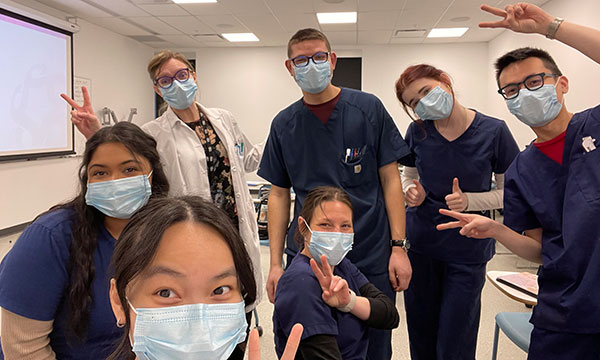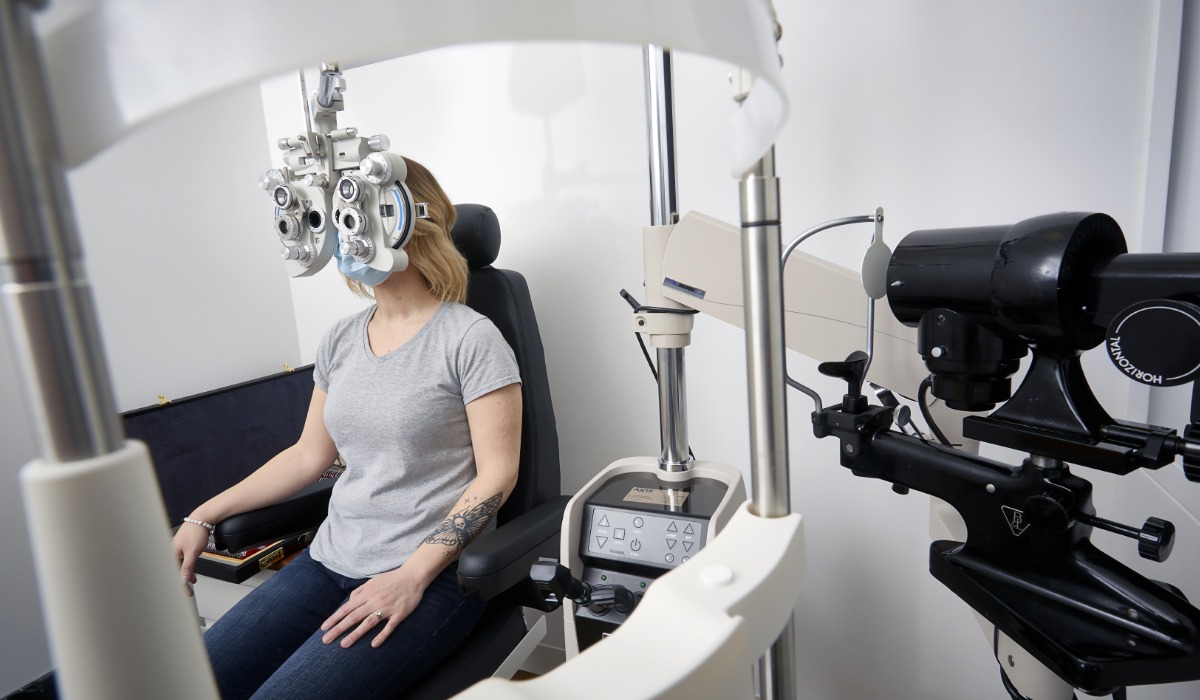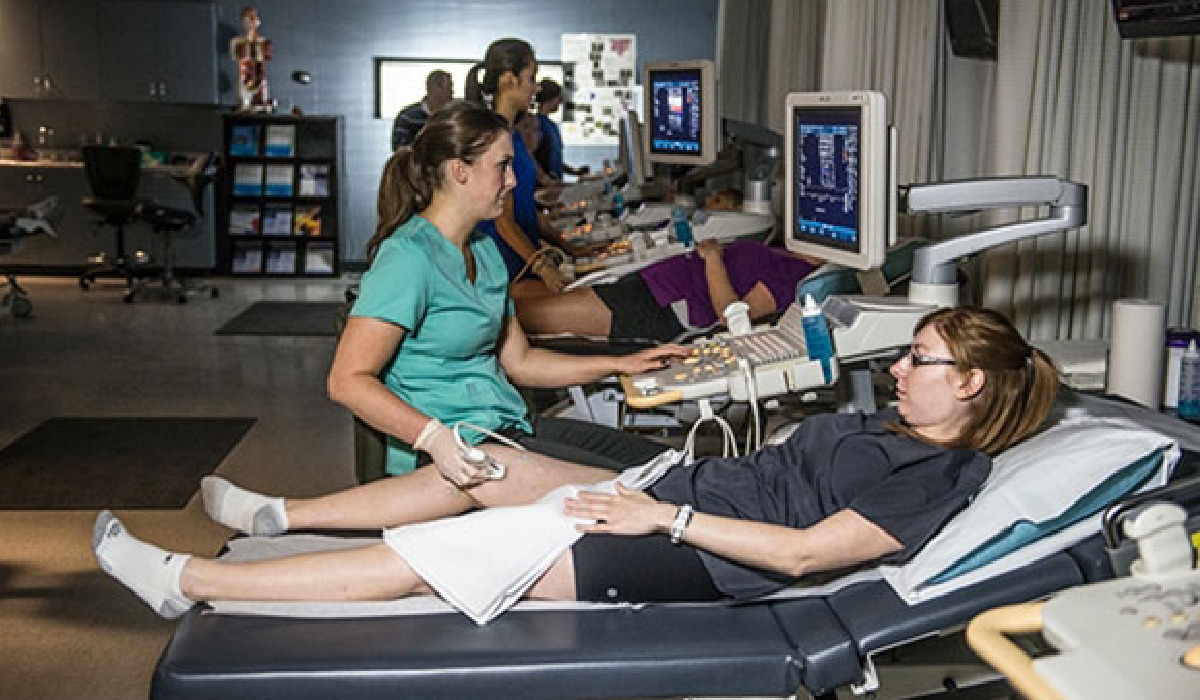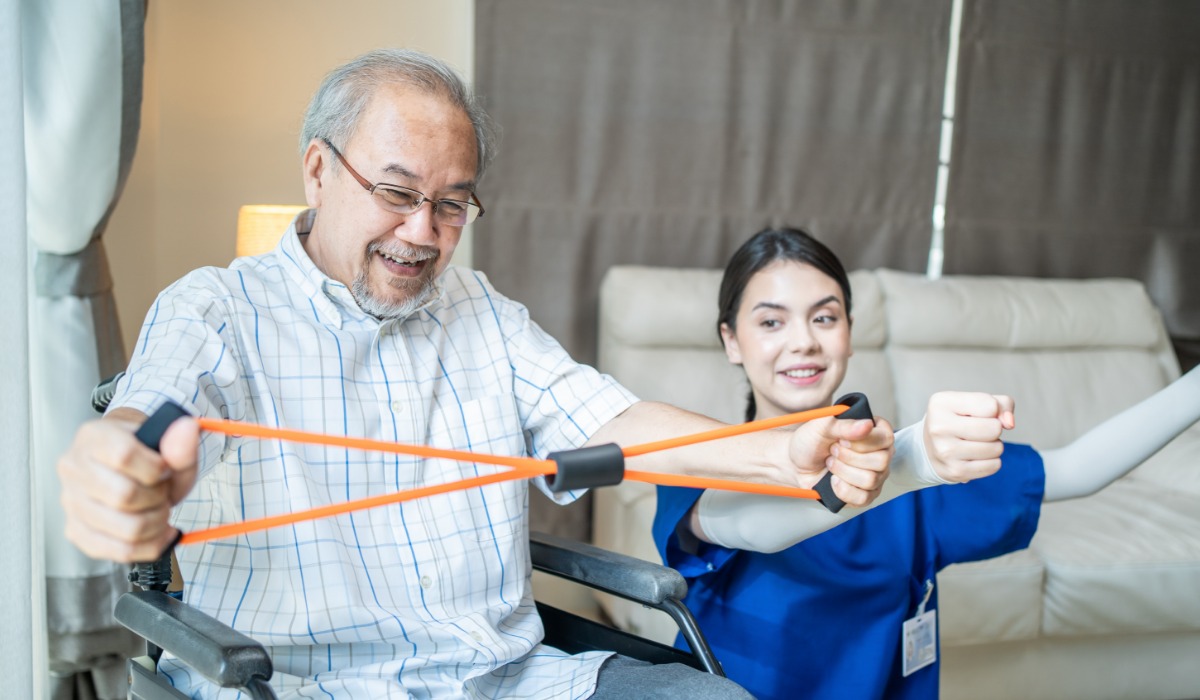Overview
Become a multi-disciplinary team member dedicated to leading-edge vision care with our Optician diploma.
In this program, you'll learn:
- ocular health, including in-depth coursework in ocular pathology
- the principles of refracting and performing accurate refraction tests
- about optical technology and equipment
- how to fill prescriptions for eyeglasses and contact lenses with precision
- how to ensure the perfect fit for a diverse clientele
- to assess, create and meet the specific eyewear needs of each customer.
In addition to these clinical skills, you'll build a strong business and retail management foundation tailored to the optical and optometry field.
Our program offers a blend of classroom lectures, laboratory sessions, and clinical practicum placements, ensuring you receive a realistic taste of your future professional environment.
As a graduate, you'll find opportunities to work in optical retail stores, ophthalmic or optometrist clinics, or other medical settings where eyewear and contact lenses are created and dispensed.
Set your sights on a rewarding occupation where you can genuinely impact people's quality of life with the SAIT Optician program.
My manager has told me she felt more confident in my skills because we were learning and working with optometrists and opticians for all of our theory and lab classes.
Whitney
2024 Optician graduate

Opticians tend to be objective, methodical and social.
You need:
- a courteous, pleasant manner
- effective communication skills
- the ability to think critically
- the ability to resolve conflicts
- the ability to study and interpret customer issues
- an eye for detail and accuracy
- to work well under stress, maintain professional behaviour and regulate your emotions
- a good sense of spatial relationships
- good fine motor skills (to manipulate small objects and instruments).
Opticians may wear personal protective equipment (PPE) for long periods, which includes exposure to latex and disinfection materials. They may also spend most of their working hours on their feet and performing repetitive tasks.
Some positions required extended work hours or shiftwork, including evenings and weekends.
You are strongly encouraged to refer to the ALIS website for career, learning, and employment information for opticians to ensure you can successfully meet the occupational requirements for the program and profession.
Graduates of SAIT's Ophthalmic and Optometric Assisting certificate program meet the admission requirements to enter this diploma program and receive credit for the first semester courses.
You will complete two required clinical practicums.
You will be assigned practicum placements with consideration given to your preference of location. However, due to limited availability in Calgary, it might be necessary for you to travel or relocate outside the city.
The healthcare field has a strong focus on health, wellness, and fitness to practice due to the demanding nature of the work and Occupational Health and Safety requirements. As such, special considerations will not be granted based on individual circumstances or preferences, except those stated as protected grounds when an accommodation has been approved.
In compliance with the practica agreements with our clinical partners, you will be required to provide specific documentation before you can participate in your practicum. Find out what requirements you need for this program.
The Optician program is aligned with the competencies outlined by the National Alliance of Canadian Optician Regulators (NACOR), and is accredited by Accreditation Canada.
Graduates will be prepared to challenge the NACOR exam and obtain a dual license as a dispensing optician and a contact lens fitter.
Upon successful completion of this program, you'll be awarded a SAIT Optician diploma.
Careers and opportunities
Each year, SAIT conducts a survey between February and April to determine the employment rate, salary and satisfaction of our newest SAIT alumni.
![]() 97% graduate employment rate
97% graduate employment rate
![]() $51,948 average starting salary
$51,948 average starting salary
Find out more about our graduate employment statistics >
Our graduates may work in the following occupations. Some careers require additional experience and education.
Associated National Occupational Classification (NOC) codes: 32100, 32129, 32109, 33109.
Career planning support
Unsure which career path is for you? Here are some recommended career planning resources to help you decide your future.
You can also head to Alberta alis for lots of information about careers in Alberta, including quizzes and labour market information to help you narrow down a path.
Finally, you can take our online career finder quiz, which can help narrow your options based on your current skills and interests.
Courses
The Optician diploma requires 66 credits (23 courses) to complete.
The program spans two years, with three semesters each year.
| Course | Credits |
|---|---|
|
This course introduces the structure of the different systems within the human body and describes how those systems work together to maintain homeostasis and keep the body alive. You will identify anatomical parts and describe the organization and relationships between chemical units, cellular components, tissues, organs and systems. |
3 |
|
This applied computer course provides students with critical electronic communications, data and file management skills, along with a strong focus on using common productivity applications to format, calculate, analyze, visualize, and present or report data and information. Equivalents:
|
1.5 |
|
This is a practical course applying knowledge of dispensing theory. Learners will receive hands-on exposure to dispensing lab tools and equipment, as well as gain experience taking measurements and verifying single vision spectacle prescriptions. This course offers hands-on training using the appropriate instruments to measure, assess and fit contact lenses. Learners will apply previously obtained knowledge of soft contacts, contact maintenance, and care. |
3 |
|
This course covers all aspects of single vision eyeglass assessment, production, and delivery to the patient. Students will learn the history of spectacles, the nature of a patient needs assessment, optics, and prescription interpretation. Students will also learn what impacts lens and frame selection, as well as how to evaluate eyeglass fit and provide follow-up care to patients. |
3 |
|
This course begins with an introduction to the history of contact lenses and moves through milestones in development, manufacturing processes, assessment methods, and the different lens options, including the range of products available for care and cleaning. The course also covers different patient factors and characteristics that impact the success of contact lens wear, the different types of manual and automated instruments used in contact lens fitting procedures, and how to take measurements and evaluate patient data and needs assessment information. Finally, this course addresses soft contact lens patient education as a means to support continued ocular health, visual acuity, and comfort, as well as product-based care systems and follow-up procedures. |
3 |
|
Ocular anatomy and physiology is the cornerstone of ophthalmic medical technology. This course covers ocular diseases, syndromes and disorders that could be understood through a strong base in anatomy and physiology of the eye. |
3 |
|
This course introduces principles and standards pertaining to clinical procedures in eye care. These include ethics, legislation, professional regulation, job roles, teamwork, and professionalism. |
3 |
|
This course introduces ophthalmic concepts that directly pertain to patient care. This includes: pretesting and supplementary testing, eyewear frames and lenses, contact lenses, refraction and ocular health, removal or application of eye dressings, business and retail, office procedures, and assisting disabled adults and child patients. |
3 |
|
This course builds on previous learning of the assessments and requirements prior to fitting contact lenses. Students will also obtain knowledge of soft lens materials, wearing schedules, modalities, and indicators for contact lens wear. Pre-requisites:
|
3 |
|
This hands-on course builds on previous learning, and enhances student competencies in a dispensing lab setting. Focus is placed on proficiency with the slit-lamp and its illuminations, in order to detect anomalies and concerns that rise from the fitting process. Further, students will learn how to properly obtain patient medical history, and convert spectacle prescriptions into contact lens prescriptions. Finally, students will be trained to insert and remove contact lenses, and perform visual assessment on patients. Pre-requisites:
|
3 |
|
This course is designed to equip students with techniques for frame adjustments and repairs, as well as with skills for managing complex prescriptions, proper lens and frame choice, and prescription interpretation. Pre-requisites:
|
3 |
|
This course provides learners with the theoretical knowledge necessary for performing automated and manual refraction. Focus is placed on methods of measuring, assessing, and detecting abnormalities in visual acuity, visual field, and binocular vision. Operating the instruments used in such testing is also covered. Pre-requisites:
|
3 |
|
This course builds on previous learning to increase the theoretical knowledge necessary for performing automated and manual refraction. Focus is placed on methods of measuring, assessing, and detecting abnormalities in visual acuity, visual field, and binocular vision. Operating the instruments used in such testing is also covered. Pre-requisites:
|
3 |
|
This course will introduce how systemic diseases can have eye implications and must not be overlooked when considering diagnosis of an eye disease or disorder. The course will also focus on medication classifications, safe medication calculations, and safe medication administration, alongside an introduction to common ocular medications and over the counter (OTC) products. |
3 |
|
This course on dispensing eyewear will enhance student knowledge of custom-made eyewear (multifocal, task specific, and children's lenses). Aphakia and its special considerations for dispensing will be discussed, as well as abnormal ocular conditions and their resolutions. Special consideration is given to anisometropia, aphakia, and other optical aberrations. Pre-requisites:
|
3 |
|
This course incorporates all components of clinical theory that have been previously learned in the program. Students are given the opportunity to refine their learning through performing manual and objective assessment of refractive errors on a patient. Pre-requisites:
|
3 |
|
This course continues to study advanced hard and soft lens design and fitting. It will also study special lens fitting considerations and modifications with respect to contact lenses and out of the ordinary ocular conditions. The course continues the learning of the pre-assessments required to fit contact lenses, and provides a detailed outline of all requirements necessary in the fitting of contact lenses. Assessment of the adnexa and cornea surface will be thoroughly discussed. Soft lens materials, wearing schedules, modalities, and indicators of contact lens wear are also covered. Pre-requisites:
|
3 |
|
In this course, measurements and fitting of advanced contact lenses and eyeglasses are practiced. This course reviews content from previous dispensing and contact lens courses. An emphasis is placed on preparation to challenge the NACOR contact lens and dispensing exam. Pre-requisites:
|
3 |
|
Building on Applied Refracting Skills 1, this course again incorporates all components of clinical theory that have been previously learned in the program. Students are given the opportunity to further refine their learning through performing visual acuity testing, manual and objective assessment of refractive errors on a patient, and providing prescriptions for the purpose of visual disturbances correction. Pre-requisites:
|
3 |
|
This course places a strong emphasis on professional selling practices, ethical conduct, and Customer Relationship Management (CRM) in sales activities. It explores the creation of long-term organizational value through customer relationships while examining the evolution of the sales profession. Market analysis methods for identifying growth opportunities and key customer segments are covered extensively. Furthermore, significant attention is given to customer-centric selling techniques, including relationship building, needs analysis, and comprehensive CRM strategies. The course also addresses vital aspects of managing a sales team, encompassing organizational structuring, sales forecasting, recruitment, training methodologies, performance evaluation, legal and ethical considerations within the sales domain. Equivalents:
|
3 |
|
Learners are provided with the opportunity to rotate through specific clinical settings in order to achieve identified clinical objectives required for achieving entry-level competencies as specified by the National Association of Canadian Optician Regulators (NACOR) Competency Profile. Pre-requisites:
One of:
|
3 |
|
In this practicum course, you will rotate through a variety of clinical settings to achieve specific clinical objectives. These objectives are aligned with the entry-level competencies defined by the National Association of Optician Regulators. Pre-requisites:
|
3 |
|
As future health care professionals, students in this course will require strategies for working effectively and respectfully within interdisciplinary teams. The course examines topics such as conflict management, problem solving, decision making, customer service, leadership, ethics and values in the health care workplace. |
1.5 |
Progression
You must attain a PGPA and/or a CGPA of 2.0 or better each semester and pass the prerequisite courses to progress through the program.
To qualify for graduation, you must pass all courses, attain a CGPA of 2.0 or better and complete course requirements within the prescribed timelines.
Review our grading and progression procedure >
Explore your options!
Some courses in this program are available through Open Studies. You can complete courses via Open Studies to get a head start on your education, reduce your course load once accepted into a credentialed program, or determine which career path best suits you before you fully commit.
You may also take courses for general interest or personal and professional development.
Admission requirements
Applicants educated in Canada
All applicants must demonstrate English language proficiency and meet the following requirements or equivalents:
- at least 65% in English Language Arts 30-1 or 30-2, and
- at least 65% in Math 30-1 or Math 30-2, and
- at least 65% in Physics 20 or Biology 30 or Science 30
or,
- completion of SAIT's Ophthalmic and Optometric Assisting program.
SAIT accepts high school course equivalents for admission for applicants educated outside Alberta.
All applicants who were educated outside of Canada must demonstrate English language proficiency and provide proof they meet the program admission requirements outlined above with an international document assessment. Find accepted educational documents and assessment options.
SAIT may also accept courses completed at certain international post-secondary institutions.
Academic Upgrading
Missing an admission requirement for this program? Upgrade your prior education to help you receive admission into one of SAIT's career programs.
English language proficiency
All applicants must demonstrate English language proficiency prior to admission, including students educated in Canada.
Transfer agreements
At SAIT, we have created transfer agreements with partner institutions to allow you to earn course credits toward your SAIT program based on your previously completed credentials.
Transfer Alberta search tool
Use the Transfer Alberta search tool to see all transfer agreements between Alberta post-secondary institutions (including those with the University of Calgary, Mount Royal University and Bow Valley College.)
Search transfer agreements in Alberta
Transfer options for graduates
When you have completed this program, you may continue your education at a partner post-secondary institution. These transfer agreements include partnerships within and/or outside of Canada.
Available intakes
Winter 2026
Start dates:
- Domestic students: Closed
-
-
Application deadline:
-
- International students: Closed
-
-
Application deadline:
-
Fall 2026
Start dates:
- Domestic students: Waitlisted
-
-
Application deadline: June 30, 2026
-
- International students: Open
-
-
Application deadline: May 29, 2026
-
Winter 2027
Start dates:
- Domestic Students (apps open March 4, 2026): Closed
-
-
Application deadline: Oct. 23, 2026
-
- International students: Open
-
-
Application deadline: Oct. 9, 2026
-
Costs
2025/26 tuition and fees
The following costs are effective as of July 1, 2025.
The estimated total cost of tuition and fees is based on the suggested schedule of study. Following a modified schedule will impact the fees you pay per semester and may alter final costs.
Domestic students
*.5 indicates a combination of full-time semester(s) and part-time semester(s) in the same academic year. In many cases, students are completing a practicum during their part-time semester. Part-time students are those taking less than nine (9) course credits in a semester. You will not be eligible for the UPass in your part-time semester.
The program total is based on the estimated amount you will pay if you enter this program during the 2025/26 academic year. The program total amount listed on your letter of admission may appear higher. This amount is your maximum tuition guarantee for the program. SAIT will not exceed this maximum, regardless of changes in tuition and fees between academic years.
*.5 indicates a combination of full-time semester(s) and part-time semester(s) in the same academic year. In many cases, students are completing a practicum during their part-time semester. Part-time students are those taking less than nine (9) course credits in a semester. You will not be eligible for the UPass in your part-time semester.
Books, supplies and uniforms are approximately $2,800.
This is a bring-your-own-device program with a standard computer hardware and software requirement. See the specific requirements on our computers and laptops page. An Apple or Windows-based laptop is required. Tablets or mobile phones are not suitable alternatives.
Find your booklist on the SAIT Bookstore's website. Booklists are created by semester and available approximately two weeks before classes begin.
Required equipment/tools
Before attending labs, you must purchase a professional optician toolkit containing essential optical tools commonly used in practice.
The kit is purchased directly through an external provider for approximately $380. Information regarding the kit will be provided during your first semester.
Required uniforms and personal protective equipment (PPE)
You will require:
- navy scrubs (pants and top)
- closed-toe, water-impermeable shoes.
Additional industry-approved PPE will be discussed before the start of labs.
Additional fees
- You are responsible for additional expenses related to your practicum, including pre-practicum requirements and relocation costs to practicum sites outside of Calgary.
- The National Alliance of Canadian Optician Regulator (NACOR) certification exam fees are:
- Optical Sciences 1: Eyeglasses and optical sciences - $750
- Optical Sciences 2: Advanced practice contact lenses - $750
- Annual registration fees for the College of Opticians of Alberta (COA) are approximately $650. Applications to, and a license from, a regulatory body are required.
Financial aid
Paying for your education may feel overwhelming, but we have resources and programs that can help, including information about payment options, student loans, grants and scholarships.
Application process
Ready to apply?
Follow our step-by-step guide to submitting a successful application.
Communication during admission
Email is the primary source of communication during the admission process. Ensure your personal email account is managed appropriately to receive our emails, files and communications.
We recommend you add hps.info@sait.ca domain to your safe senders' list or you risk missing critical email messages.
Begin your application
Apply now using the online application portal.
Ensure you have a valid Visa or Mastercard to pay the non-refundable application fee of $120 for domestic applicants or $175 for international applicants.
Information sessions
Prepare for a strong start in your chosen program or get the details you need to decide your future path.
Our expert staff and faculty are ready to answer your questions and provide information about the following:
- What sets SAIT apart
- An introduction to the program and area of study
- Admission requirements
- Future career paths
- Information on the earning potential and graduate employment rates.
Contact us
School of Health and Public Safety Advising
-
Email - hps.info@sait.ca
International Student Advising
-
Phone - 403.284.8852
-
Email - international@sait.ca
Subscribe for updates
Your journey starts here! Sign up to get important updates on:
- Health and medical programs
- Application information
- Relevant news and events

Oki, Âba wathtech, Danit'ada, Tawnshi, Hello.
SAIT is located on the traditional territories of the Niitsitapi (Blackfoot) and the people of Treaty 7 which includes the Siksika, the Piikani, the Kainai, the Tsuut’ina and the Îyârhe Nakoda of Bearspaw, Chiniki and Goodstoney.
We are situated in an area the Blackfoot tribes traditionally called Moh’kinsstis, where the Bow River meets the Elbow River. We now call it the city of Calgary, which is also home to the Métis Nation of Alberta.




